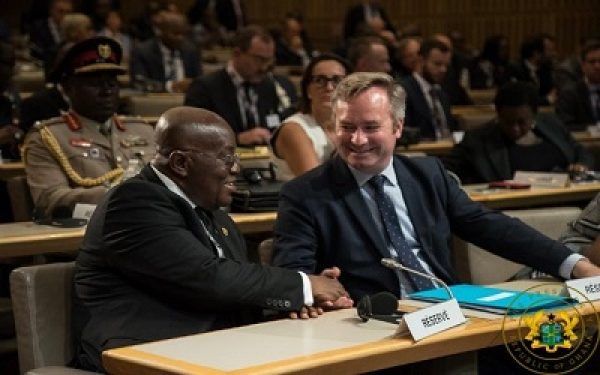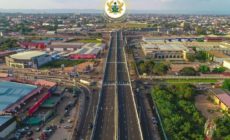According to him, Ghana is a country where legitimate investments are protected.
“We are a country where the principles of democratic accountability and respect for the rule of law, individual liberties and human rights are now firmly entrenched in our body politic, and where the separation of powers is real in promoting accountable governance under the rule of law,” he said.
President Akufo-Addo said this on Tuesday at the France-Ghana Business Forum, held at the Ministry for the Economy and Finance, in Paris, as part of his official visit to France.
President Akufo-Addo told the gathering that his administration has resolved to build a progressive and prosperous country, and is drawing inspiration from the success story of countries around the world.
“We have also decided to walk hand-in-hand with the private sector and the business community on this journey. This is because the New Patriotic Party, the party from which my Government is borne, is of the firm conviction that the role of the private sector in the development of our national economy is crucial,” he added.
President Akufo-Addo told the gathering that since assuming the reins of office some two and half years ago, his government has put in place measures needed to reduce the cost of doing business, and improve the business environment.
“Our goal is to make our economy the most business-friendly economy in Africa,” the President added.
Reiterating that “it is an exciting time to be in Ghana and to do business in the country”, he enumerated a plethora of multinational companies that are seeking to establish bases in the country.
Already, global car manufacturing giants, Volkswagen of Germany, Sinotruk of China, Nissan and Toyota of Japan, and Renault of France, are working to establish assembly plants in the country. Energy giant, ExxonMobil of the United States of America, is establishing an office and base in Ghana.
Google has established the first Artificial Intelligence Centre in Africa in Ghana, and Norway’s energy giant, Aker Energy, has, in the time of President Akufo-Addo, made discoveries of substantial offshore oil and gas deposits.
President Akufo-Addo urged the business community in France to take advantage of the growing business-friendly climate in the country to invest in Ghana.
“I am sure you may have heard of some of my government’s flagship policies of “One District, One Factory”, “One Village, One Dam”, and the programme for “Planting for Food and Jobs”, which I commend to you, as I do areas in water, health, housing, road and rail infrastructure, transport, industry, manufacturing, agriculture, petroleum and gas, the exploitation of our mineral wealth of bauxite, iron ore and gold, renewable energy and ICT growth,” the President said.
He was particularly excited about the dramatic revival of Ghanaian agriculture that has been occasioned by the successful implementation of our programme for Planting for Food and Jobs, which has, within two years, brought a million smallholder farmers under its ambit.
In tackling Ghana’s infrastructural deficit, the President revealed that his government is embarking on an aggressive public private partnership programme to attract investment in the development of both the country’s road and railway infrastructure.
“We are hopeful that, with solid private sector participation, we can develop a modern railway network with strong production centre linkages and with the potential to connect us to our neighbours,” he added.
President Akufo-Addo told the French business community that they can choose to invest in Ghana through the Ghana Investment Promotion Centre or set up as a Free Zones enterprise.
“Regardless of where the investment is, government has instituted a number of incentives for the investor, depending on the nature of the activity, or the location of the investment,” he added.
Some of these incentives, the President said, include exemption from payment of import duty for plant and machinery; 25 per cent tax rebate for companies located in regional capitals; 50% tax rebate for companies investing outside regional capitals; zero percent corporate tax for 10 years, and, thereafter, 8 per cent for companies in the Free Zones enclave; full repatriation of dividends and profits; transfer of funds to service foreign loans; and laws against arbitrary confiscation of company or investment.











 (Selorm) |
(Selorm) |  (Nana Kwesi)
(Nana Kwesi)